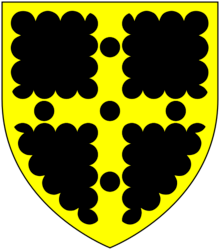Sir Fulke Greville
- For his son, the poet, see Fulke Greville, 1st Baron Brooke

Sir Fulke Greville (1536 – 15 November 1606) of Beauchamp Court near Alcester in Warwickshire, was an English gentleman.
Origins
He was born in 1536, the son of Sir Fulke Greville (d. 10 November 1559) by his wife Elizabeth Willoughby, 3rd Baroness Willoughby de Broke (d.1562), grand daughter and heiress of Robert Willoughby, 2nd Baron Willoughby de Broke,[1] the wealthiest heiress of her time.
Inheritance
His mother Elizabeth Willoughby survived her sisters, who had no children. By modern law, this would mean that she would have become suo jure Baroness Willoughby de Broke (and Baroness Latimer), both ancient titles created by writ and thus able to pass to females. Thus her son Fulk Greville would in turn have inherited from her as 4th Baron Willoughby de Broke and 12th Baron Latimer. But this right was not established in law until 1696, by his great-grandson, the 11th Baron Willoughby de Broke.
Marriage & progeny
In 1553 he married Anne Neville (d.1583), a daughter of Ralph Neville, 4th Earl of Westmorland,[2] a distant cousin. By his wife he had progeny as follows:
- Fulke Greville, 1st Baron Brooke and 5th Baron Willoughby de Broke
- Margaret Greville (1561–1631/2), who married Sir Richard Verney,[3] High Sheriff of Warwickshire in 1572.
Death & succession
On his death on 15 November 1606 at Beauchamp Court near Alcester, his estate (including any claim to the titles) passed to his eldest son, Fulke Greville, 1st Baron Brooke and 5th Baron Willoughby de Broke. After the murder of his son in 1628, they passed to his daughter Margaret Greville, 6th Baroness Willoughby de Broke, wife of Sir Richard Verney of Compton Verney in Warwickshire.
Footnotes
- ↑ Richardson I 2011, pp. 336–8; Richardson II 2011, p. 269.
- ↑ Gouws 2004.
- ↑ Gouws 2004
References
- Gouws, John (2004). Greville, Fulke, first Baron Brooke of Beauchamps Court (1554–1628). Oxford Dictionary of National Biography. Retrieved 12 December 2012. (subscription required)
- Richardson, Douglas (2011). Magna Carta Ancestry: A Study in Colonial and Medieval Families, ed. Kimball G. Everingham. I (2nd ed.). Salt Lake City. ISBN 1449966373
- Richardson, Douglas (2011). Magna Carta Ancestry: A Study in Colonial and Medieval Families, ed. Kimball G. Everingham. II (2nd ed.). Salt Lake City. ISBN 1449966381
External links
| Peerage of England | ||
|---|---|---|
| Preceded by Elizabeth Greville nee Willoughby |
Baron Willoughby de Broke 1560–1606 |
Succeeded by Fulke Greville |